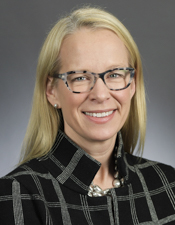Proposed study could look at disparities in breastfeeding rates
Breastfeeding helps to establish the bond between mothers and babies while providing a host of other health benefits, but those benefits don’t impact Minnesotans equally.
Rates of breastfeeding are “much lower” among African-American and Native American women in comparison to white women, Rep. Kelly Morrison (DFL-Deephaven) told the House Health and Human Services Policy Committee Wednesday.
Morrison sponsors HF1167, which would direct the Health Department to work with community stakeholders to study the barriers, challenges and successes related to this issue and to recommend culturally appropriate practices to address disparities.
Rep. Karin Housley (R-St. Marys Point) sponsors a companion, SF1383, which awaits action by the Senate Health and Human Services Finance and Policy Committee.
While national data indicates causes ranging from education to cultural practices to poverty, there is no Minnesota-specific information to use as a foundation for effective, culturally appropriate solutions, said Morrison, an obstetrician and gynecologist.
Health organizations generally recommend that babies be exclusively breastfed for their first six months. For babies, this can provide a decreased risk of disease, fewer doctor’s visits and lower rates of childhood obesity. Mothers who breastfeed experience decreased risks of hypertension, cardiovascular disease, and post-partum depression in addition to increased post-partum weight loss, she said.
“It’s so important …” Rep. Debra Kiel (R-Crookston) said. “It really, honestly, is very beneficial to the mom as well as the baby.”
But, in communities where breastfeeding is less common, women and infants alike can miss out on those benefits.
“This is potentially an important piece in that puzzle,” when it comes to addressing broader health disparities in the state, Morrison said.
Rep. Mike Freiberg (DFL-Golden Valley) commented that breastfeeding can be difficult for some women, and sought assurance the bill wouldn’t unnecessarily pressure them to breastfeed if they have reasons for choosing to use formula instead.
Morrison said that she is “acutely aware” of those challenges, and that access to formula – like access to C-sections – is incredibly important, but that the alternative is generally preferable.
“Breastfeeding doesn’t work for everyone … and no one should be ashamed by that,” Morrison said.
The study would need to address the initiation, duration, and exclusivity of breastfeeding as well as policy, systemic, and environmental factors that support access or create barriers. A report would be due to the Legislature by Sept. 15, 2020.
Related Articles
Search Session Daily
Advanced Search OptionsPriority Dailies
Ways and Means Committee OKs proposed $512 million supplemental budget on party-line vote
By Mike Cook Meeting more needs or fiscal irresponsibility is one way to sum up the differences among the two parties on a supplemental spending package a year after a $72 billion state budg...
Meeting more needs or fiscal irresponsibility is one way to sum up the differences among the two parties on a supplemental spending package a year after a $72 billion state budg...
Minnesota’s projected budget surplus balloons to $3.7 billion, but fiscal pressure still looms
By Rob Hubbard Just as Minnesota has experienced a warmer winter than usual, so has the state’s budget outlook warmed over the past few months.
On Thursday, Minnesota Management and Budget...
Just as Minnesota has experienced a warmer winter than usual, so has the state’s budget outlook warmed over the past few months.
On Thursday, Minnesota Management and Budget...
